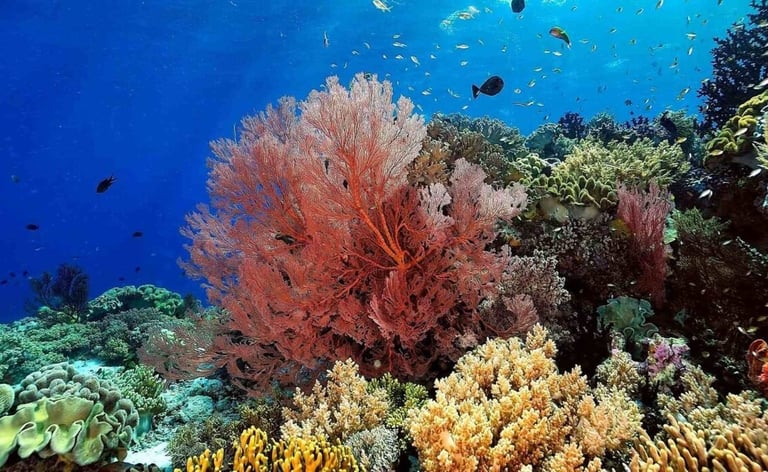The Endangerment of Coral Reefs
ENVIRONMENTAL ISSUES
Danny Xu
11/29/20242 min read


Coral reefs are vibrant, colorful, unique, and valuable organisms found throughout the ocean. Coral reefs are very important for providing many animals like fish, lobsters, clams and many more all need these reefs for homes, food, and nursing areas. However, despite the importance of coral reefs, many of them in the world are dying and becoming a bigger and bigger concern as time progresses.
One reason why coral reefs are rapidly dying is due to climate change. Global warming is another on going problem in the world right now were the Earth's temperature is getting hotter. Due to this, the ocean water is also becoming warmer and coral reefs are very sensible to even the slightest change in the temperature around them. Once this happens, corals are more vulnerable to factors like storms. In the past, it took coral reefs about 20 years to make a full recovery after being exposed to a different water temperature, however, due to global warming, not enough time is given to coral reefs to recover and therefore, many are dying. Furthermore, carbon dioxide, a greenhouse gas responsible for global warming is being let out into the atmosphere all the time due to humans. The ocean takes in a carbon dioxide and due to the rapid increase of it, the water in the ocean is becoming more acidic toward coral reefs.
Another reason for the decline of coral reefs is due to pollution. For example, plastic pollution in the ocean is very deadly toward coral reefs. Although this is not with 100% certainty, it is believed that the bacteria found on plastic infects coral and blocks it from being able to receive sunlight. Not only that, but pollution in the forms of trash, oil spills, runoff, sewage, and many more can all be harmful to coral reefs.
Lastly, physical damage to coral reefs is also a huge contributor to their destruction. There are boats used for activates like tourism that sometimes make contact with fragile coral causing it to break off. Fishing techniques like blast fishing, used to scare fish out of hiding are also very deadly toward coral reefs. Cyanide fishing, which involves putting cyanide to stun fish also hurts coral. Sometimes, snorkelers that stand on coral or put on non-mineral sunscreen can also contribute to destroying coral reefs.
In conclusion, in the past 30 years, about half of the world coral reefs have already been destroyed. Coral reefs are essential for aquatic life and should be preserved for keeping Earth as a biodiverse planet and for the well-being of all organisms both in the ocean and on land.
Sources:
“Facts | Coral Watch.” n.d. https://coralwatch.org/facts/#:~:text=How%20much%20coral%20is%20lost%3F&text=In%20last%2030%20years%2C%2050.
Noaa. 2022. “Anthropogenic Threats to Corals - Corals: NOAA’s National Ocean Service Education.” Oceanservice.noaa.gov. NOAA. 2022. https://oceanservice.noaa.gov/education/tutorial_corals/coral09_humanthreats.html#:~:text=Pollution%2C%20overfishing%2C%20destructive%20fishing%20practices.
Colbert, Angela. n.d. “Vanishing Corals, Part Two: Climate Change Is Stressing Corals, but There’s Hope.” Climate Change: Vital Signs of the Planet. https://climate.nasa.gov/explore/ask-nasa-climate/3290/vanishing-corals-part-two-climate-change-is-stressing-corals-but-theres-hope/#:~:text=However%2C%20with%20climate%20change%2C%20the.
US Department of Commerce, National Oceanic and Atmospheric Administration. 2023. “What Species Live in and around Coral Reefs?” Oceanservice.noaa.gov. January 20, 2023. https://oceanservice.noaa.gov/facts/coral_species.html#:~:text=Millions%20of%20species%20live%20in%20and%20around%20coral%20reefs&text=Fish%2C%20corals%2C%20lobsters%2C%20clams.
Razek, Layla. 2022. “6 Reasons Coral Reefs Deserve Protection.” Pew.org. December 6, 2022. https://www.pewtrusts.org/en/research-and-analysis/articles/2022/12/06/6-reasons-coral-reefs-deserve-protection#:~:text=Coral%20reefs%20are%20hotbeds%20of.
